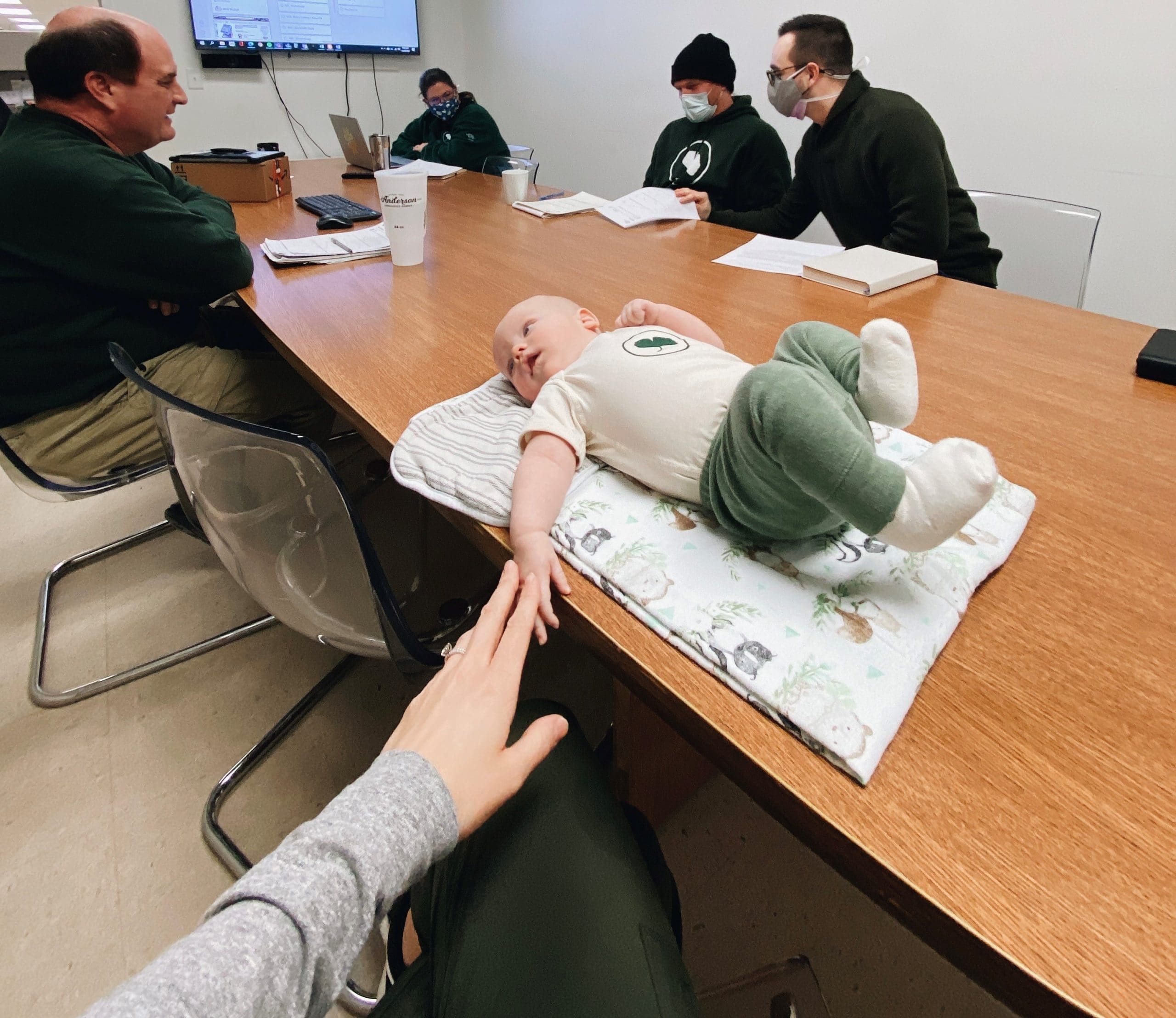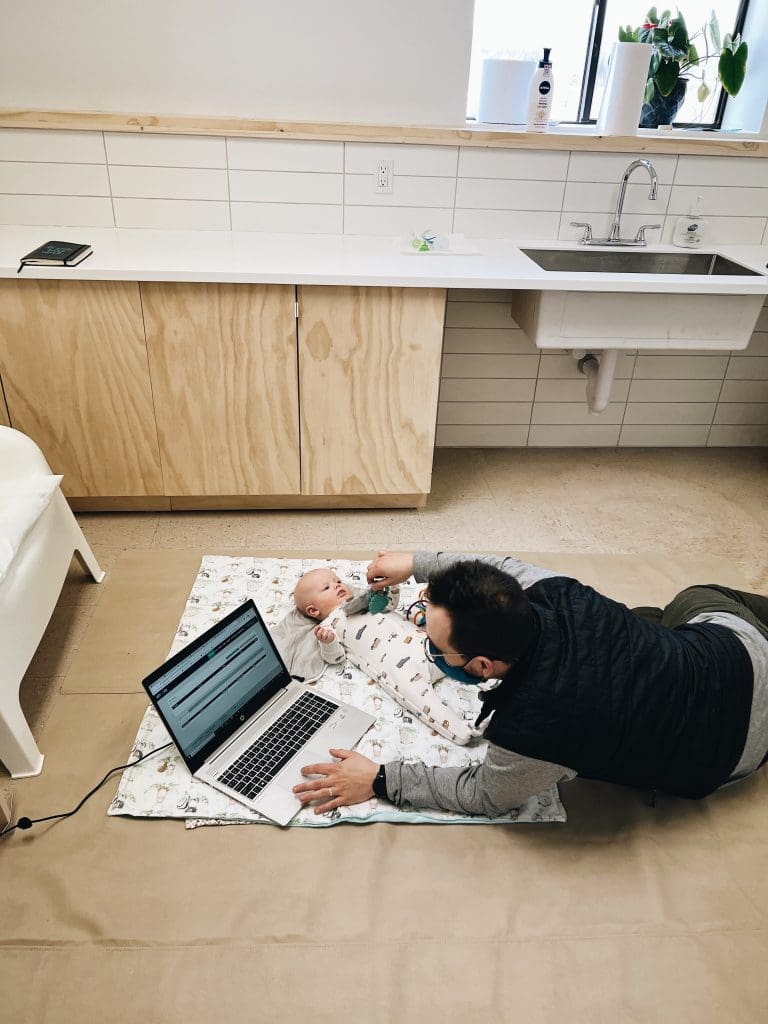
Photo: Brett Hicks
Having a child is a full-time job. It is common for women in America who return to their jobs after having a baby to find the workforce is an unsupportive environment for them.
This isn’t the case for Mulhall’s, based in Omaha, Nebraska. Founded in 1956, the company takes the phrase ‘family business’ far beyond the nature of their ownership.
“Today, we choose to call ourselves a family business as a reminder of the kind of team we’re trying to build: a team that cares deeply and personally – like a family – but where we push each other with the ambition and vigilance required for a business to endure,” says Brett Hicks, head of people at Mulhall’s. “We believe people do their best work when they trust and feel trusted and that’s what makes our Infants at Work program possible.”
It wasn’t until Hicks as well as two other women on staff announced their pregnancies that Mulhall’s set about creating company policies and procedures to make the transition back to work with new babies a great experience.
“Mulhall’s leadership team really made supporting us moms a high priority, which made the process feel genuine and gratifying,” Hicks says.
The company’s Infants at Work program was inspired by other organizations that already had it in place, such as Patagonia and the Washington State Department of Health.
Muhall’s Infants at Work program allows babies to come to the office until they are mobile or six months old.

Photo: Brett Hicks
“People might have a misperception that babies in the office must mean there’s crying and distractions all day long, but that’s simply not true!” Hicks says. “Most of the day, our babies are happily playing on the floor beside us while we work or they’re snoozing in the infant nap room or they’re in our arms while we converse in meetings. Bringing my son with me to work has not only bonded me closer to him, but it’s also strengthened my workplace relationships!”
Mulhall’s CEO Mick Mulhall says that having a baby in meetings helps them think more strategically and longer-term as they keep things in perspective.
“The presence of a child has a beautiful way of bringing out the conscientiousness of our people and elevating our company values and purpose to the forefront of our team’s minds,” Hicks says. “The experience has far exceeded my expectations and I’m filled with deep gratitude to Mulhall’s and all my colleagues for their positive reception to an out-of-the-box idea.”
During her maternity leave, Hicks’s inbox was rerouted so she didn’t have three months of emails to sort through when she returned. She says it’s up to each individual parent going on leave to decide how they want to navigate their time out of the office.
“It was my team who encouraged me to completely disconnect and fully enjoy the time with my son and, therefore, they took the initiative to reroute my inbox and take care of all my emails while I was away,” Hicks says. “I was immensely grateful for that kind gesture.”
The week Hicks left on maternity leave, construction on a Wellness/Mother’s Room started so it was ready for her, and the other mothers return to the office.
“Our Wellness/Mother’s Room has soft seating and laptop tables,” Hicks says. “It has a sink and mini-fridge for storing breastmilk. We have storage cabinets that we keep diapers, wipes, blankets, and more in. There’s also a small closet attached to the room that is windowless – a nice, dark space where our babies nap! We have a small crib, video baby monitor, and sound machine in there – essentially a nursery at work.”
If you’re wondering how to be more inclusive to new parents at your own landscape company, Hicks advises starting small.
“Plan more family-friendly company events, don’t ask working parents to stay late, and be flexible when they want to attend a school recital or an afternoon baseball game for their child,” Hicks says. “As a new mom, I know it goes a long way just knowing if my kid gets sick, I can work from home or miss a day without my team being upset.”
On the long-term side of things add encouraging language to your policies and handbooks so it’s clear you are inclusive towards parents. An example of this is an excerpt from Mulhall’s Team Member Handbook on lactation breaks: “This isn’t really a policy – we just want to be sure you feel comfortable taking lactation breaks when you need to. There are Wellness Rooms at both our Maple and Fort Campuses that are available firstly to you. And if you’re reading this, you’re a mom and you work here and that’s super cool!”
“The language in it is so supportive, encouraging, and inclusive,” Hicks says. “It makes me feel great as a mom to read this!”

